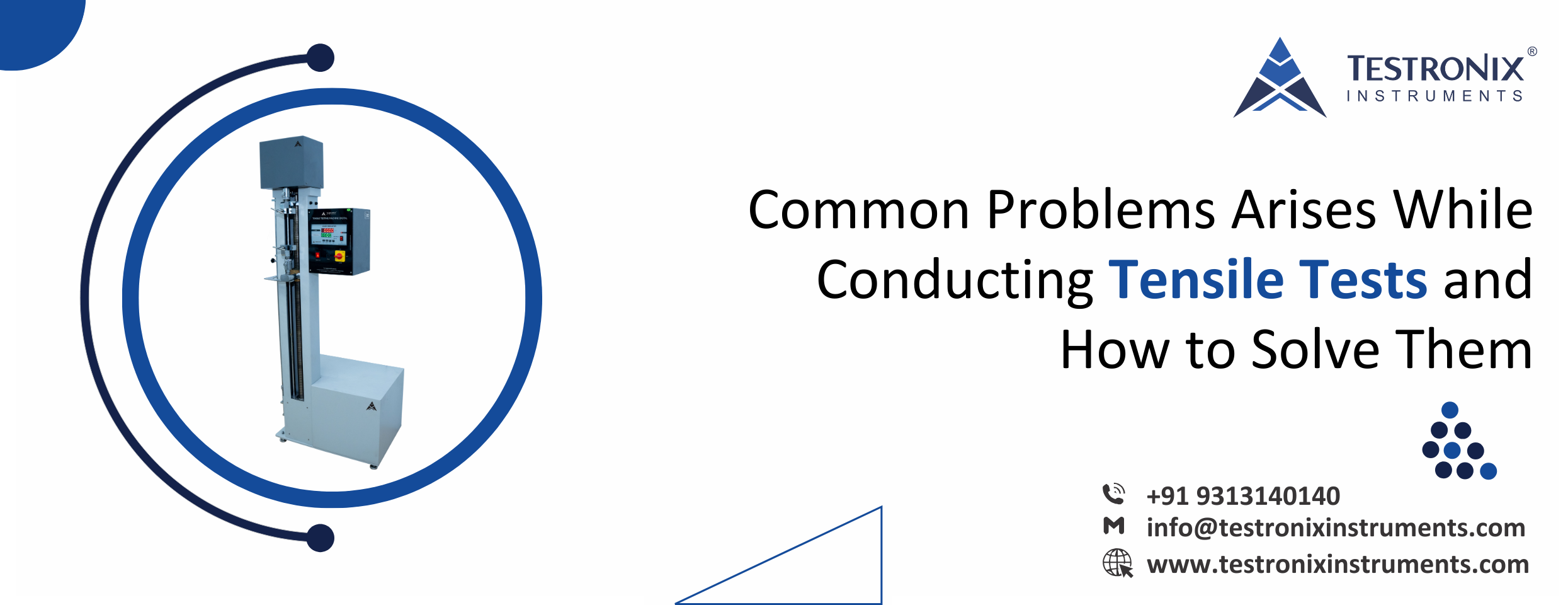Tensile Testing, also known as tension testing, is a destructive examination in engineering and materials science. In this quality test, controlled tension is exerted on a sample until it reaches complete failure.
This method stands among the most frequently employed mechanical testing techniques, serving the purpose of assessing both the strength of a material and its extent of stretchability before reaching a breaking point. Tensile Testing is instrumental in determining crucial material properties such as yield strength, ultimate tensile strength, ductility, strain hardening characteristics, Young's modulus, and Poisson's ratio. Testronix offers high quality digital tensile tester that will be used to test the tensile force that a material can withstand without breaking.
This testing instrument follows industrial standards including ASTM D412, ASTM D429-73, ASTM D624, ASTM D638-01, ASTM D76, IS 13360-5-7, IS-3400 that will help the manufacturers in ensuring the quality of materials. In this blog, we will discuss brief information about the common problems that may arise while conducting tensile strength tests on the materials.
Different properties that can be tested using tensile tester

The tensile testing machine represents a cutting-edge instrument employed for evaluating the tensile strength of diverse materials across various industries. This advanced testing instrument can generate significant tensile forces, providing precise and accurate analyses. Widely utilized in quality control laboratories and mainstream production processes, this instrument proves invaluable for conducting thorough quality assessments of materials and products.
- Yield Strength is the juncture at which plastic deformation initiates under stress. This critical point is ascertained through testing across a measured gauge length, facilitated by extensometers. These devices can take the form of mechanical clip-ons or, in cases where non-contact is a constraint (e.g., elevated temperature testing), video-based systems are employed.
- The ultimate tensile strength will represent the peak stress of the material that a sample will experience when tensile force is applied to it. Material properties are subject to change based on environmental conditions, such as extreme temperatures, whether hot or cold.

- Modulus of Elasticity, also referred to as Young's modulus, quantifies the stiffness of a specimen by assessing its ability to revert to its original state after the removal of a load. Beyond a certain point where the material undergoes stretching and no longer returns to its original length, Hooke's Law ceases to be applicable. This threshold is recognized as the elastic or proportional limit, which is also synonymous with the yield strength.
These are some properties of materials that can be tested using a tensile strength tester. You can read more on understanding the mechanics of tensile testing.
Tensile strength testing principle
Undoubtedly, tensile testing stands out as the most prevalent method employed in both force measurement and material testing. Its primary purpose is to evaluate the mechanical behaviour of a component, part, or material when subjected to static, axial loading.

While the test method remains similar for both material testing and force measurement, the outcomes differ. Tensile tests are specifically conducted to discern the tensile properties of a material or component. The deformation of the test sample is scrutinized to characterize its ductility or brittleness, along with key features such as tensile strength, yield point, elastic limit, percent elongation, elastic modulus, and toughness. You can read more on why tensile testing on metals is necessary for material testing.
At Testronix Testing Instruments, we have crafted an exceptional tensile strength tester dedicated to calculating the tensile force, aiding manufacturers in testing the tensile properties of metals. As the specimen undergoes separation, the force applied ultimately results in destruction. The Testronix Tensile Strength instrument meticulously captures and displays the peak value at which this destruction occurred on its digital display. If you want to know more about this testing equipment like tensile tester price, features or other related information then you can give us a call at +91 9313140140 or email us at info@testronixinstruments.com.





